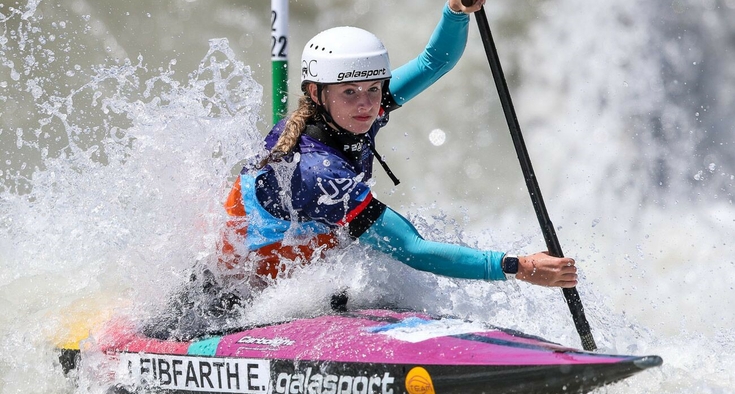When you’re at a sporting event as a sports medicine provider, you don’t watch the game the same way a spectator does, said Dr. Keith Anderson of Novant Health Cotswold Medical Clinic. “When people are watching a basketball game and somebody takes a shot, everyone watches the ball to see what happens. As a sports medicine doctor, you start to train your eyes to go down to their ankles.”
Anderson brings just that eye to the USA's elite canoe/kayak slalom team, where’s he’s served as the sports medicine provider for the last 11 years. And he’ll be on hand at the time trials April 12 through 14 at the U.S. National Whitewater Center in Charlotte, where he’ll be watching for paddles getting wedged and shoulders being wrenched, heads getting knocked on rocks, or lacerations that need to be sewn.
“These athletes are really tough though,” said Anderson. “They’ve been doing this for a long time. They’re in cold water all the time, getting bumped, pulled, pushed, cut up. So they’re not really much of a complainer group. So sometimes I actually have to go find them, when I see them bleeding or I see them get hurt.”

While he’ll be out at the trials, he’ll also be doing his usual juggling act of office hours and sports event work that week. At the office, Anderson, who’s double board-certified in family medicine and sports medicine, does a mixture of wellness visits and treating sports injuries.
As for his primary goal in the office and at events, he said, “I really almost never tell athletes to quit training. It’s usually just, how do we adjust this to allow you to get better?”
A doctor, and Ironman
When it comes to athletics, injury and pain, Anderson has been there. Not only is he currently training for another full Ironman triathlon and a couple of half Ironman competitions with his wife, Anderson has always been an athlete and has played a ton of sports — from soccer to football.
“In med school, that’s when I started getting injured more often,” he said, whether it was his shoulder, or his knee or his back. He was in and out of the sports medicine clinic at the University of Oklahoma College of Medicine, and the sports medicine doctor there started inviting him to cover games with him. He loved it so much he decided to make a career out of taking care of athletes.
Anderson joined Novant Health in 2010 after his fellowship and says he ended up in the right place at the right time and started connecting with various sporting events as a go-to physician. His résumé so far includes – but is not limited to – providing sports medicine expertise for the Charlotte Marathon, Queens University, the Ironman World Championship, the 2011 World's Strongest Man World Championship and the London 2012 top world games.
Seeing injuries as they happen makes diagnosis and treatment at these events that much easier. It’s very different from a clinic setting, he said. There he sees an injury and determines what needs to be done over the next week or two. At an event, it’s about quick decisions – stabilizing an athlete and getting them through the event versus sending them to the hospital in an ambulance.
“At an event,” he said, “part of what you’re deciding is, what is the injury, is it something that if you continue competing you can make it worse? Those are the toughest decisions, deciding when somebody can’t continue competing.”
He added: “You hope those don’t happen very often, but you’ve got to be ready for it.”








